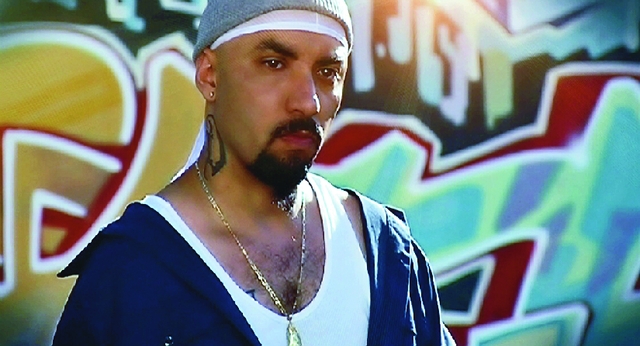Los Angeles rapper Deadlee wasn’t wanting for media attention last year. On his release Assault with a Deadlee Weapon he fired back at hip-hop’s most homophobic MCs: Eminem, DMX and 50 Cent, even accusing 50 of having deep-seated homosexual tendencies: "He is a classic man who had homo feelings and chooses to lash out, because he is afraid he might act out on his true feelings," Deadlee says. Sure, these may not be new ideas, but it’s refreshing for many to hear a fellow hip-hop lover fighting the paradigm of extensive homophobia as acceptable. Have you always been a hip-hop fan? This is what we grew up on. When they say, "gays doing hip-hop?" I’m like, it doesn’t seem that far-fetched to me, because it’s been our music, too. When it’s time to make music, that’s just what came out of me. Was it hard growing up and hearing such homophobic and violent things about gay people in hip-hop? You know what? Hip-hop didn’t start that way. When I was a kid listening to it, it was more about music and breakdancing—just a different mentality. It was even educational for a while. You had your Public Enemy and even NWA that went up against police. It seemed like it started around the Eminem days. He needed something to pick on: If a white guy’s picking on fags, it seemed OK to do. Before that people wouldn’t pinpoint a certain sexuality. I don’t know what made it cool to do that. You called them on it. Right. I don’t think we’re weak, and it’s our music, too. Have you experienced any backlash? Not so much. I haven’t heard anything from the artists themselves, but their fans send me hate mail every day and some death threats or whatever, claiming gays shouldn’t be doing hip-hop. That’s not going to stop us. People think it’s a gimmick. But I guess what they don’t understand is there are people like us out here. That’s why we’re doing a tour. Have you ever been a fan of a mainstream artist who says homophobic things? I think that’s what started it. Eminem, I like his skills. I think he’s creative. I can compare myself to him because my style is a little similar. I work with gay kids in group homes. We’re all fans of his music, and he’s talking about trans and fags. Here I am in this van driving these kids around, and we’re hearing it. We bought this CD, and we’re listening to it. I even told this one kid who loved Eminem, I’m like, "Watch boy. I’m going to go head-to-head with this punk." Have you always been out as a performer? When I started writing my first album, my producer said, "You need to just be truthful. That’s what hip-hop is about." I didn’t trip on that. I was working with gay youth, and these kids are out in their schools at a young age, 11 or 12. They’re harassed by these straight kids. I’d have to go pick them up sometimes, because they were getting beat up and would have to leave school early. Councilors and principals weren’t doing a damn thing about it. I was like, "Hell no. If these kids are doing it, I can’t be a punk and not be out." What do you have in common with mainstream artists? We might be rapping about sexual relationships, but we’re doing different adjectives. The drinks, the bling—I’m not into that, but some gay artists do that stuff. I think it’s even more diverse with gay hip-hop artists. We are struggling. We’re the group that’s hated on. We have something more to say.
Deadlee is headlining the HomoRevolution Tour, which comes to Albuquerque with Johnny Dangerous, Tori Fixx, QBoy, Mz. Fontaine, Salvimex, Bigg Nugg, JFP and Foxxjazell. They'll be at the Pulse Nightclub at 9 p.m. on Monday, April 2. The show is 18+ and tickets are $20. An all-ages pre-show party at Out Ch'Yonda will include comedy from some of the artists on tour and comic Dana Cory.









